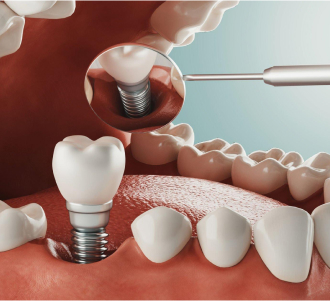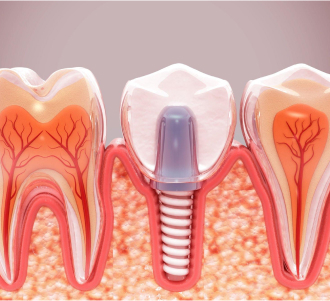
What is dental Implant?
Dental implants are artificial tooth roots that are used to hold a replacement tooth or bridge. They are made of titanium and other materials that are compatible with the human body. Implants provide a strong foundation for fixed (permanent) or removable replacement teeth that are made to match your natural teeth.
Why Dental Implant?
Dental implants are a great option for replacing missing teeth. Dental implants provide a strong, durable and natural-looking option for replacing missing teeth. They are surgically placed in the jawbone and act like a natural tooth root, allowing for the placement of a custom-made artificial tooth, bridge or denture. Dental implants can help restore a patient’s bite and smile, improve speech and chewing, provide support for facial muscles and help to prevent the shifting of adjacent teeth. They also eliminate the need for dentures and bridges which can be uncomfortable and inconvenient.

What is the Procedure for Dental Implant?
The procedure for dental implants generally consists of the following steps:
- Consultation
During the initial consultation, the dentist will evaluate your medical and dental history, take x-rays, and discuss the best treatment plan.
- Placement
During the placement procedure, the dentist will numb the area, make an incision in the gum, and place the implant into the jawbone.
- Healing Period
After the implant is placed, it needs to heal and integrate with the jawbone.This can take several months.
- Restoration
The final step involves placing a crown, bridge, or denture onto the implant.The restoration will be custom-made to match your natural teeth.
Post Treatment Care of Dental Implant Treatment?
- Brush and floss your teeth twice a day as normal.
- Avoid chewing and biting on hard foods, like ice, nuts, or bones.
- Avoid using cigarettes, tobacco, and alcohol.
- Drink plenty of water and use a soft toothbrush.
- Visit your dentist regularly for check-ups and cleanings.
- Use an oral irrigation device, such as a Waterpik, to flush out food particles and bacteria from around the implant and surrounding gum tissue.
- Use an antimicrobial mouth rinse daily to reduce bacteria and plaque buildup.
- Wear a night guard, if prescribed, to protect your implant from night grinding.
Smile Solutions Family Dentistry is known as the best dental implant clinic in Chennai, with locations in Chrompet and Thoraipakkam. We offer high-quality implant treatments at affordable prices, making us a top choice for dental implants in the city.
Our skilled dentists in Chrompet and Thoraipakkam specialize in implants and have years of experience and a strong record of successful procedures. Finding a trusted and skilled dental implant specialist in Chennai at a reasonable price can be challenging, but at Smile Solutions, our implant surgeons are widely recognized for their expertise and long-standing success.



